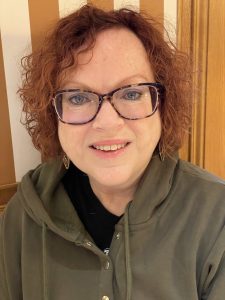Kathleen Lewis of Spotsylvania has been a volunteer communications director for Central Virginia Justice Initiative since 2014. She also provides prevention education and awareness, survivor support, and serves on the board of directors. Kathleen is a former journalist and has worked in human services for many years. She is writing her first novel.
Reading is in my DNA and is deeply connected to my past and present. You could say that reading was even a part of the repertoire of learned survival skills, especially as an acceptable outlet for emotions.
For many who grew up in the 60s-70s, crying was considered a character weakness. For the adult who was talking, listening to the radio, watching television, or wanted quiet after a hard day at work, it was just plain nerve wracking.
Crying is a response to emotions such as helplessness, sadness, fear, anger, and/or pain. I can sort through those feelings now, but, as a child, I didn’t have the skills, guidance or support in exploring this emotional hodgepodge that was signaled by a burst of tears. This led to a lot of unpleasantness and my efforts to squelch whatever I was feeling.
The one time when crying was acceptable in my home was in sympathy or empathy with characters in a story. I could cry my heart out for Jody, the protagonist child in the 1939 Pulitzer Prize-winning The Yearling, opens a new window, by Marjorie Kinnan Rawlings. Jody adopts an orphaned fawn, his best friend dies, and the family struggles to maintain their small farm in the backwoods of Florida where bears roam, hurricanes loom, and fights break out, neighbor against neighbor. There is a lot to cry about in the story, and it helped that, while my mother read to us before bed, she cried too.
In my late 20s, when I began to debrief my childhood, I turned to books on co-dependency, sexual abuse, and domestic violence, as well as books on cognitive therapy, and, later, books about PTSD, complex PTSD, and trauma. These books helped me understand the atmosphere of my childhood and teen years. Reading them gave me permission to seek counseling, knowing that I was taking care of myself. Reading them also taught me that crying is a biological function to rid the body of toxins and release pent-up emotions. Crying isn’t a weakness; it’s good for you.
I turned to books when I wanted to learn about human trafficking. Two memoirs I recommend are Girls Like Us: Fighting for a World Where Girls Are Not for Sale, an Activist Finds Her Calling and Heals Herself, opens a new window, by Rachel Lloyd. It’s an account of the author’s journey from victimization to empowerment and advocacy as the founder and CEO of Girls Educational and Mentoring Services, Inc. (GEMS), and Walking Prey: How America’s Youth Are Vulnerable to Sex Slavery, opens a new window, by Holly Austin Smith. Both books pair personal experience with insightful and informative narrative that describes their entries into and exits from trafficking and its residual effects.
On the subject of trauma, PTSD, complex trauma, causes and biological brain changes, and the healing process, the go-to book is The Body Keeps the Score, opens a new window, by Bessel Van der Kolk, M.D.
The Wounded Heart: Hope for Adult Victims of Childhood Sexual Abuse, opens a new window, by Dr. Dan B. Allender, is an intensive read that delves into how childhood sexual abuse distorts a person’s self-image and characterization of God.
The Betrayal Bond: Breaking Free of Exploitive Relationships, opens a new window, by Patrick Carnes, Ph.D. Anything written by Carnes on relationships and addictions is worth reading.
And now for some favorites in fiction.
Perusing the library audiobooks led me to these two writers who have never lost their appeal. The first is Jim Butcher, whose Dresden Files, opens a new window series starring wizard and private investigator Harry Dresden whetted my appetite for fantasy/mystery. The first book I read was a collection of short stories called Side Jobs, opens a new window.
The second is Benjamin Black, pseudonym for author John Banville, whose Quirke, opens a new window series captivated my heart and endeared me to the deeply flawed Dublin-based pathologist who is more crime solver than pathologist. The first book in the series is Christine Falls, opens a new window.
The Song of the Cell, opens a new window, by Siddhartha Mukherjee, is a must-read for anyone who wants to understand how cells defend themselves against viruses and so much more. Complicated biology and physiology is written in such a way that a person without a background in the sciences can understand.


